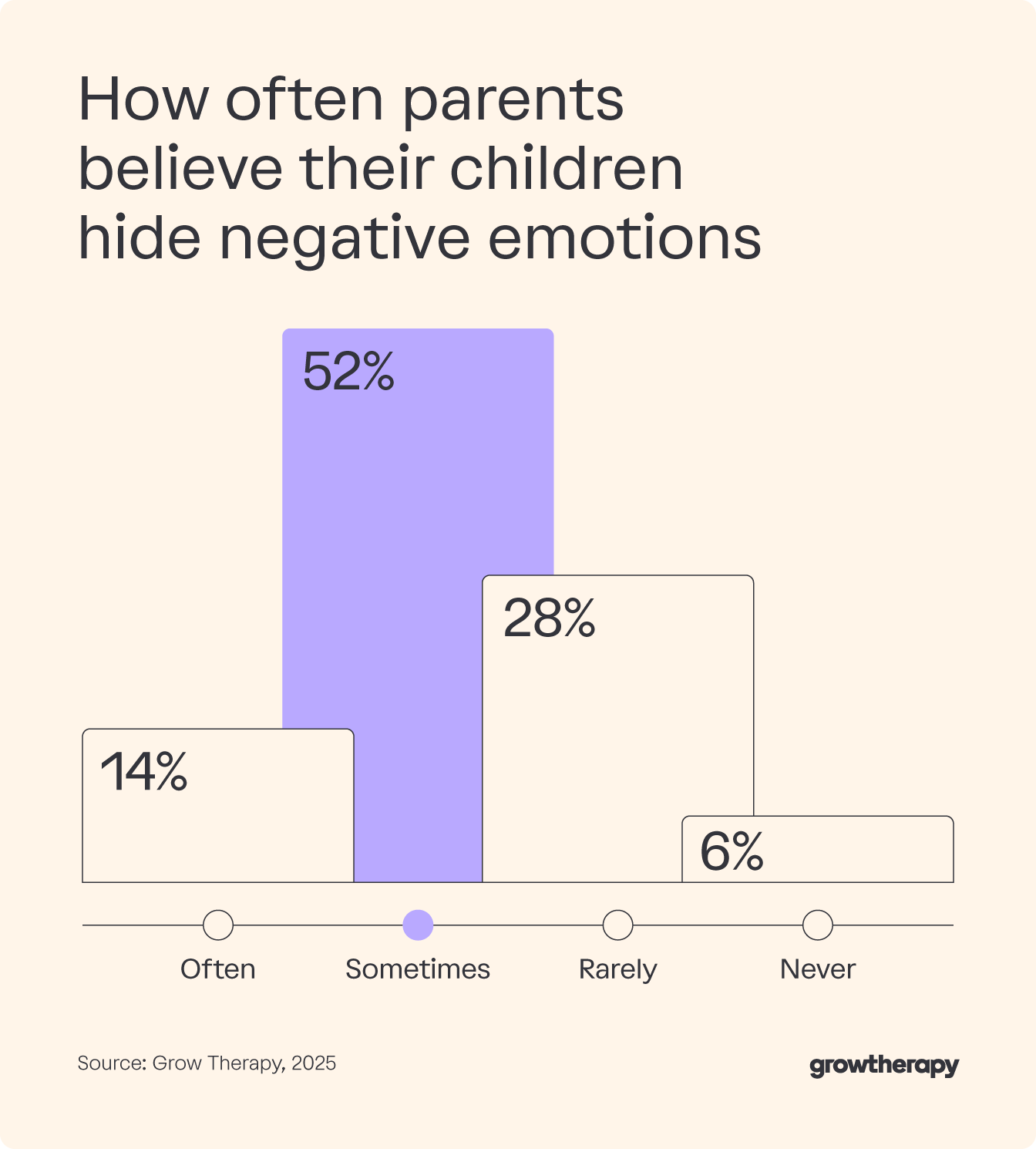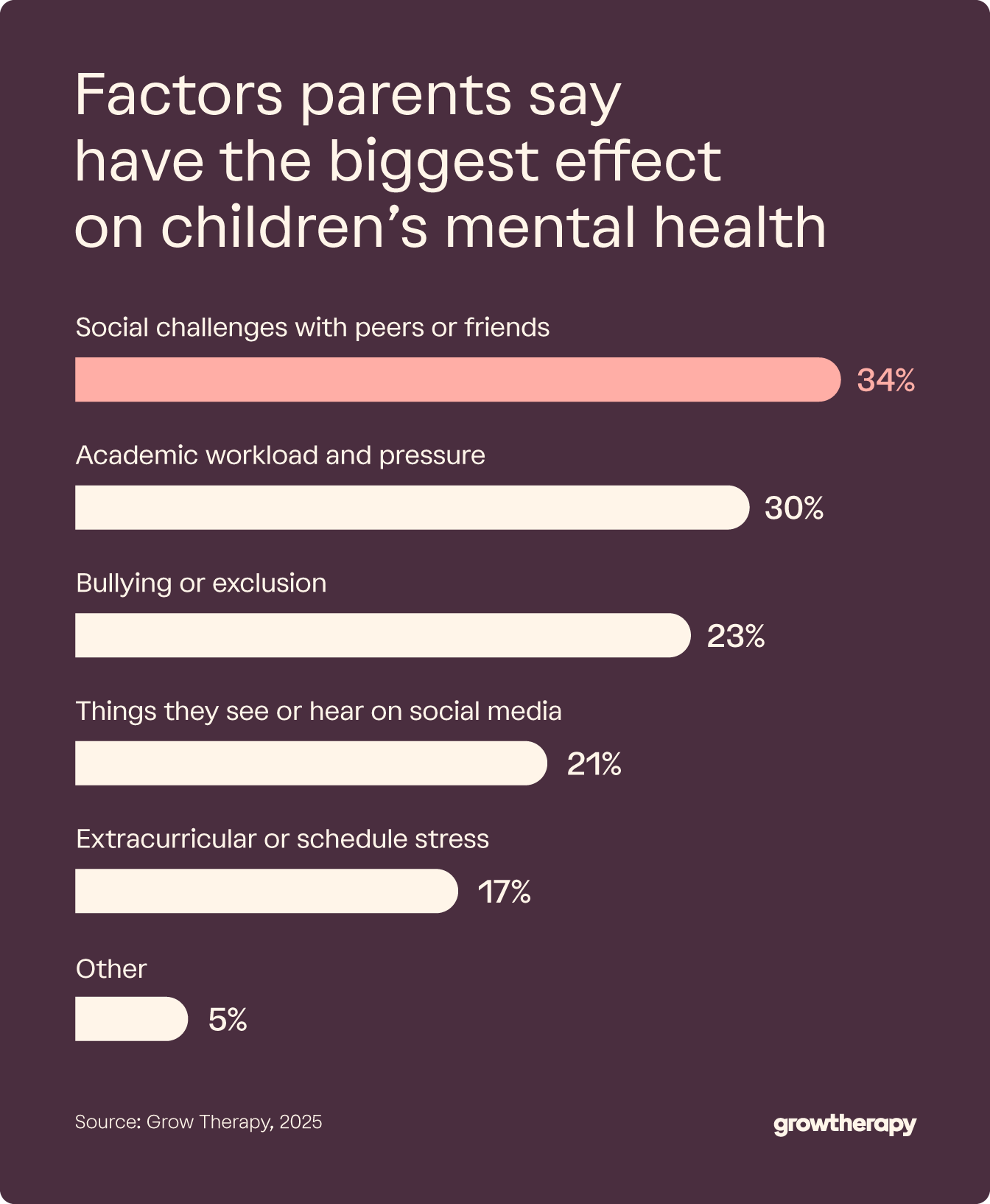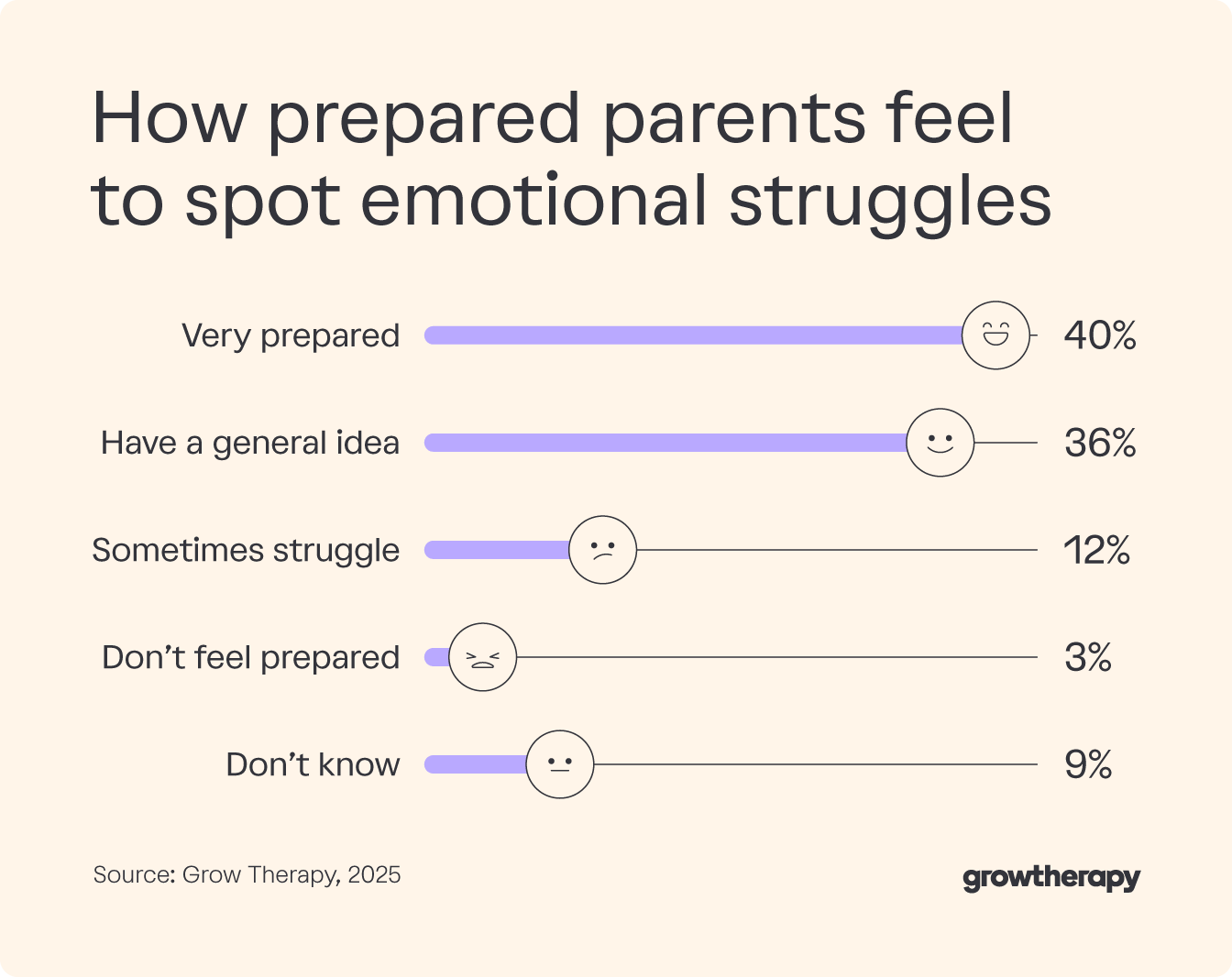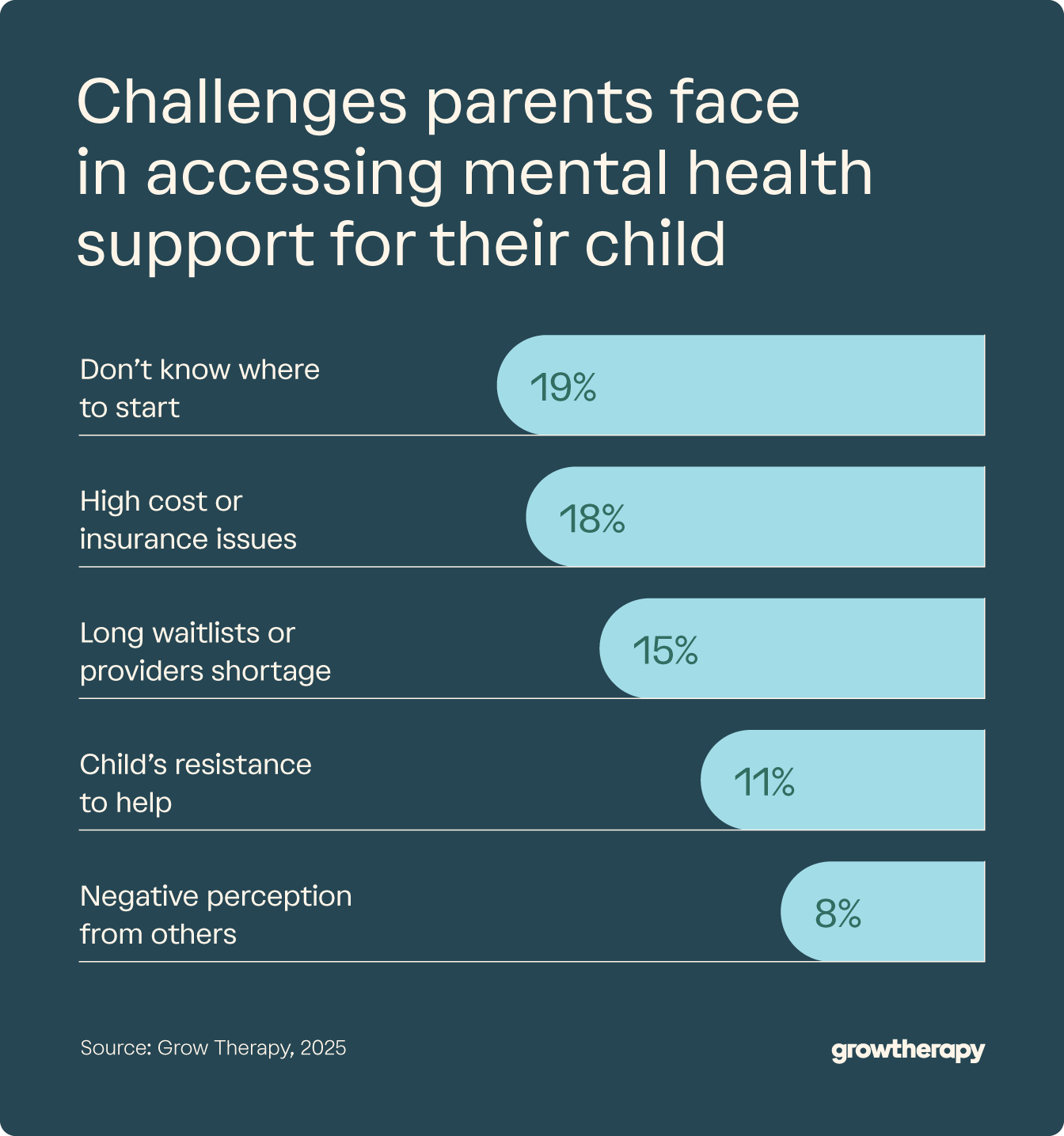The school year is in full swing, and with it comes a mix of excitement and adjustment for families. While children settle into classes and reconnect with classmates, returning to routines and responsibilities can also feel overwhelming at times.
Grow Therapy’s 2025 parent survey sought to understand how these pressures affect children’s mental health. The results show that while some children face challenges during the school year, growing parental awareness and therapy are helping them manage stress and build resilience.
Key takeaways
- Almost half of parents say their children struggle emotionally when school starts.
- Two-thirds say their child sometimes or often hides negative emotions from them.
- One in three parents says social challenges have the biggest negative impact on their child’s mental health.
- Among Grow Therapy parents, 88% say they feel less worried about their child’s mental health since starting care.
Stress at school affects nearly half of children, often unseen by parents
Nearly half of parents (41%) report that their children experience noticeable stress, anxiety, or sadness during the school year. Between homework, social pressures, and the demands of extracurriculars, some children carry stress that isn’t always visible at home.
Two-thirds of these parents report that their child at least sometimes hides negative emotions, with 14% saying it happens often.
On the flip side, 51% say their children thrive emotionally and approach school with positivity, showing that many kids are navigating the school year with confidence and balance. By raising awareness and encouraging open conversations, parents can support their children before small challenges grow into bigger ones.

Social challenges and academic pressure top the list of stressors
When parents consider what affects their children’s mental health the most, social challenges and academic pressure stand out. About one-third of parents say peer relationships and social dynamics have the biggest impact on their child’s wellbeing, while 30% point to academic workload and pressure. Bullying or exclusion also ranks high, reported by nearly a quarter (23%) of parents.
These numbers show school stress isn’t just about grades. Navigating friendships and managing social expectations can be just as challenging as keeping up with homework or preparing for tests. While these pressures can affect many children, growing awareness and improved access to therapy are helping families manage stress more effectively and approach school with greater confidence.

Parents are learning to recognize emotional struggles
Even as some children experience negative emotions, many parents are becoming increasingly attuned to their children’s emotional well-being. About 40% say they feel very prepared to recognize warning signs of mental health struggles, while another 36% have a general sense and could use more guidance.
“I see the pattern of parents taking their child/children’s mental health seriously in regard to paying attention to behavior changes, talking to their child/children, and seeking support for them, such as therapy or school-based resources,” says Monica Randle, LPCC, a Grow Therapy provider.
An additional survey of parents whose children are currently in care with a Grow Therapy provider reinforces this trend. Of the 116 parents surveyed, 88% report feeling less worried about their child’s mental health after starting care, and 79% say they are having more honest conversations about mental health.
With parents increasingly tuned in to their children’s emotions, families are finding ways to provide support before difficulties become more serious.

Experts share ways parents can support children
Parents don’t have to figure out school-related stress alone. Experts emphasize that small, consistent steps can make a meaningful difference in helping children navigate challenges.
Randle says that creating a balanced home environment is a key first step. This means setting up a predictable routine, building in regular breaks, and showing children how to practice healthy coping strategies themselves. These habits add up and can help children develop proactive habits for handling stress.
At the same time, it’s important to pay attention to signs that a child may still be struggling. Randle explains, “Depression, anxiety, and stress may show up differently in children compared to adults. Signs or symptoms may look like irritability, frustration, isolation, or shutting down. Children may even distract themselves with things to avoid certain stressors, like homework or social activity. There may be sudden behavior changes and/or changes in sleep patterns.”
Regular check-ins help parents notice these signals. Randle advises, “Ask questions and let [children] know you are there for support.” Consistent attention helps children feel seen and understood, making it easier for them to open up and practice coping strategies.
Therapy is becoming more accessible for children
Alongside regular check-ins and daily support, professional therapy can give children additional tools to cope with stress and build resilience. Randle says, “Therapy is a safe space to talk through emotions versus holding them in, or expressing them in unhealthy ways. Therapy can help children learn coping strategies that not only minimize symptoms but also manage them.”
“Therapy is a safe space to talk through emotions versus holding them in, or expressing them in unhealthy ways. Therapy can help children learn coping strategies that not only minimize symptoms but also manage them.”
Accessing mental health support can feel confusing at first, but emerging solutions are helping to lower barriers. Approximately 19% of parents say that not knowing where to start is the biggest challenge in seeking help for their child — a problem that they can address with the proper guidance and resources. Other common hurdles include high costs or insurance limitations (18%) and long waitlists or a shortage of providers (15%).
Encouragingly, parents who responded to our Grow Therapy survey indicate that these barriers are becoming easier to overcome:
- 91% were able to find care covered by insurance
- 71% said finding care for their child was easier than expected
- 85% were able to access affordable care
Additionally, more platforms are offering a wider selection of clinicians and expanding insurance coverage, making paying for therapy more accessible. Together with flexible online therapy options, these developments make it increasingly possible for families to connect children with the support they need.

Access licensed therapists for your child with Grow Therapy
As parents pay closer attention to their children’s emotional well-being, therapy offers families a proven path to manage stress before it escalates. Grow Therapy makes getting professional support simple with flexible appointment times, no long waitlists, and no subscription required. Book your first appointment today.
Methodology
- The survey was conducted online by YouGov among a total of 752 parents of children under 18 years of age. Fieldwork took place from September 29 to October 3, 2025. Respondents were selected from the YouGov panel using randomized invitations and completed the survey via an online interview.
- The results have been weighted to reflect the demographic profile of all U.S. adults (aged 18+) who are parents of children under 18 years of age.
